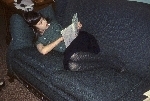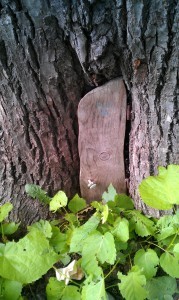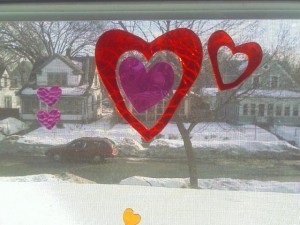Alison McGhee's Blog, page 18
April 24, 2014
99 Words: Basso Profundo
 When I get a cold, my voice often drops octaves from its usual soft-and-needs-a-mic-in-front-of-audiences self to a James Earl Jones-ish bass.
When I get a cold, my voice often drops octaves from its usual soft-and-needs-a-mic-in-front-of-audiences self to a James Earl Jones-ish bass.
Stentorian.
In my high school teacher days I caught many colds and I liked that deep, changed voice. It was unexpected and powerful.
But here’s the thing: If that giant voice comes rumbling out of my chest like the thumping bass in a passing car when I’m sick, doesn’t it mean that it’s always there, just hidden?
I keep thinking about this. I’m at a pivotal point in life. The thought of unseen and untapped power is entrancing.
April 19, 2014
Poem of the Week, by Jeffrey Harrison
Renewal
- Jeffrey Harrison
At the Department of Motor Vehicles
to renew my driver’s license, I had to wait
two hours on one of those wooden benches
like pews in the church of Latter Day
Meaninglessness, where there is no
stained glass (no windows at all, in fact),
no incense other than stale cigarette smoke
emanating from the clothes of those around me,
and no sermon, just an automated female voice
calling numbers over a loudspeaker.
And one by one the members of our sorry
congregation shuffled meekly up to the pitted
altar to have our vision tested or to seek
redemption for whatever wrong turn we’d taken,
or pay indulgences, or else be turned away
as unworthy of piloting our own journey.
But when I paused to look around, using my numbered
ticket as a bookmark, it was as if the dim
fluorescent light had been transformed
to incandescence. The face of the Latino guy
in a ripped black sweatshirt glowed with health,
and I could tell that the sulking white girl
accompanied by her mother was brimming
with secret excitement to be getting her first license,
already speeding down the highway, alone,
with all the windows open, singing.
April 6, 2014
Pencil Sketch, 750 words: Clyde
 I liked Clyde the minute I saw him. This was summer, more than twenty years ago.
I liked Clyde the minute I saw him. This was summer, more than twenty years ago.
I had just moved to Minneapolis and Clyde was standing at the open back of his mail truck, plucking envelopes and flyers out of white bins and organizing them into complicated sheaves.
He rarely said anything back then. But there was something about the methodical way he sorted that mail and the solid way he moved from building to building that brought me calm and relief when I saw him, as if the world was more reliable than it seems.
That first year, I wrote him a note when the holidays rolled around. We began to talk, a tiny bit, now and then: hi’s and how you doin’s. In summer he wore blue mail shorts, in winter a red, black and green winter knit cap that I think of as his snow beanie.
After a few years I had a baby and then another one and then another still. I moved to a different house. It was only a few blocks away but it wasn’t on Clyde’s route. We still waved and smiled whenever we saw each other, Clyde with his big bag of mail, me with a baby in a backpack or toddlers in strollers or in a child seat on the back of my bike.
The years went by and the kids got bigger. Clyde shaved his head. I got my long hair chopped off. He stayed big, I stayed scrawny. I published a book.
“I see you,” Clyde called across the street one day. He was laughing and shaking his finger at me. “Don’t think you can hide. I woke up this morning and saw your photo in the paper.”
I crossed the street to talk to him.
“I got a question for you,” he said. “All these years when I watch you walking around, walking walking walking all those long walks, are you writing books in your head?”
I shook my head. Nope.
“I don’t know, girl,” he said. “You might be writing them but you don’t even know it.”
Time went by and other things changed, big things, and I moved again in haste and stress. I didn’t see Clyde for a long time.
And then, about a year after that hasty move, I turned the corner when walking my dog and there he was. Beaming. He was as big as ever but there was something lighter about him. He gave off a feeling of joy.
“Girl!” he said. “Where you been!”
My heart swelled at the sight of him, at the sound of his familiar voice, and to my horror I started to cry. Clyde bent his head and closed his eyes and then he wrapped his arms around me. He didn’t say anything else. Neither did I.
I kept moving. Twice. And once more. All within a few blocks of my original apartment, but still not on Clyde’s route. Every few months I would be out with my dog or out running, and there he would be.
“You grew your hair out,” I said to him last summer. “It looks great.”
“You’re blonde now,” he said. “Are you having more fun?”
It’s been a long time now that I have lived within Clyde’s orbit. A long time now that I have watched him sifting through letters and packages in those white bins in the back of his mail truck. He has been the bearer of so much news over the course of those years, news that he is unaware of –marriage and birth and death and bankruptcy and scholarships and party invitations.
Yet maybe he is aware of what he carries in that mail pouch. Maybe that’s why he moves with such gravitas from block to block.
At the beginning of this endless winter I saw Clyde on the other side of the street. It was a bitter day.
“How are those kids?” Clyde shouted, his breath pluming out. I filled him in as he stood opposite, shaking his head in wonder at the fact that they were in college now.
 An hour and a half later, I turned the corner on my way back home with the dog and there he was again. He bent his head in what looked like sorrow at the sight of me.
An hour and a half later, I turned the corner on my way back home with the dog and there he was again. He bent his head in what looked like sorrow at the sight of me.
“Girl,” he murmured. “You been walking a long, long time.”
“So have you, Clyde,” I said. “All day, every day.”
“We’re both strong,” he said. “You know we are.”
April 5, 2014
Poem of the Week, by Ash Bowen
Collect Call
- Ash Bowen
Somewhere out there, an operator plugged in
the wire of your voice to the switchboard
of Arkansas where I am
happy to accept the charges—an act so antique
I think of Sputnik beeping
overhead, lovers petting in Buicks
and glowing with the green of radium dials.
But what you’ve called to say is lost
in the line’s wreckage of crackle and static.
The night you went away
the interstate glowed red beneath the flaring
fins of your father’s Cadillac.
Now this collect call
from outer space & what you’ve called to say
is clear at last: Among stars
lovers come and go easy as you please. It’s the gravity
of Earth that makes letting go so hard.

–
For more information on Ash Bowen, please click here: http://www.arkansasliteraryfestival.org/authors/ash-bowen.html
–
My blog: alisonmcghee.com/blog
My Facebook page: http://www.facebook.com/home.php?#!/pages/Alison-McGhee/119862491361265?ref=ts
March 29, 2014
Poem of the Week, by Ted Kooser
A Washing of Hands
- Ted Kooser
She turned on the tap and a silver braid
unraveled over her fingers.
She cupped them, weighing that tassel,
first in one hand and then the other,
then pinched through the threads
as if searching for something, perhaps
an entangled cocklebur of water,
or the seed of a lake. A time or two
she took the tassel in both hands,
squeezed it into a knot, wrung out
the cold and the light, and then, at the end,
pulled down hard on it twice,
as if the water were a rope and she was
ringing a bell to call me, two bright rings,
though I was there.

–
For more information on Ted Kooser, please click here: http://tedkooser.net/
–
My blog: alisonmcghee.com/blog
My Facebook page: http://www.facebook.com/home.php?#!/pages/Alison-McGhee/119862491361265?ref=ts
March 24, 2014
One-day Creative Writing Kickstart class!
Greetings writerly types,
I’m offering two sessions of a Creative Writing Kickstart class on Saturday, April 19. The class will touch on various aspects of creative writing craft, but the main focus is to get the creative juices flowing. We’ll read and discuss some fabulous published works –poetry, memoir and fiction– and complete three or four short writing prompts, each of which draws on a different sort of artistic inspiration.
The class is fun and low-key and designed for writers of all abilities, experience levels and genres. If you’re a longtime writer in need of a boost or someone who’s always had an interest in writing but never known how to sit down and get started, please join us! And please feel free to share this on to anyone who might enjoy the class.
Limited to twelve. If you’re interested, please email me at alison_mcghee@hotmail.com to reserve a spot. Note: These classes tend to fill fast.
Date: Saturday, April 19
Two sessions: 1) 9-12:30 and 2) 1:30-5 p.m.
Place: my house in the Uptown neighborhood of south Minneapolis. On-street parking is usually plentiful, and I’m three blocks from several bus stops in all directions.
Cost: $50, payable via check.
Bring: yourself, a pen and a notebook. Water and some sort of tasty treat will be provided.
March 23, 2014
400 Words
 At 20, I got on a plane and flew from Vermont to Taipei. I had the name of a cheap hotel and I took a cab there from the airport.
At 20, I got on a plane and flew from Vermont to Taipei. I had the name of a cheap hotel and I took a cab there from the airport.
Neon lit the night city with its weird and garish light. Wooden shacks leaned against concrete buildings; people squatted on the narrow streets, eating spears of orange fruit and sipping cups of tea. Dark-haired toddlers were everywhere, wearing jackets so padded that their tiny arms stuck straight out.
When I got out of the cab, everyone stared. This was a long time ago; foreigners were few and far between in Taiwan. Toddlers looked up at me –way up– and screamed.
I felt like screaming, too. My Chinese was bad. I was filled with fear. What had I gotten myself into?
Once in my cinderblock room I realized that I was starving, with only fish-flavored crackers left over from the plane to eat. But I couldn’t force myself out of that room. There was a deep bathtub, like a shoebox turned on end, and I drew my knees up to my chest and stayed in it, more or less continually, for three whole days.
On the fourth day, I emerged. It wasn’t bravery that drew me forth, but starvation. At the front desk three Chinese men milled about, chattering softly in Mandarin. At the sight of me they too froze and stared. The giant white American girl.
“Nimen hao,” I said. “Wo feichang feichang e.”
Hi. I’m very, very hungry.
All three leapt into action. They conferred, then one guided me across the street to a small building. He nodded and smiled encouragingly and pointed to a rickety table, then to a menu handwritten on a piece of torn paper taped to the wall. I recognized the characters for potsticker, ordered three dozen and ate them all.
I was alone in what felt like another world. I had none of what I needed to survive: no friends, no family, no place to stay, no college-designed program abroad, not enough money. And I had a fierce and inborn belief that I had and would ever have only myself to rely on, there in Taiwan, or anywhere.
But I was wrong. All it took was one admission –I’m starving– from a scared and hungry girl, and strangers crowded around, wanting to help. The kindness in those men’s eyes has stayed with me always.
March 22, 2014
Poem of the Week, by Rainer Maria Rilke
from The Ninth Elegy, by Rainer Maria Rilke
Praise this world to the angel, not the unsayable one,
you won’t impress him with your glorious emotions; out there,
where he feels with more feeling, you’re but a novice. Rather show him
some common thing, shaped through the generations,
that lives as ours, near to our hand and in our sight.
Tell him of things. He’ll stand more awed; as you did
beside the ropemaker in Rome or the potter by the Nile.
Show him how joyful, how pure, how much ours, a thing can be,
how even the lamenting of sorrow resolves into pure form,
serves as a thing, or dies into a thing –, and, in going across,
blissfully flows from the violin. –And these things,
that live by going away, know that you praise them; fleeting,
they look to us for rescue, us, the most fleeting of all.
They want us to transform them completely in our invisible heart
into – oh infinitely – into ourselves. Whoever finally we will be.
(Rainer Maria Rilke, translated by Galway Kinnell and Hannah Lieberman)

–
For more information on Rilke, please click here: http://www.poets.org/poet.php/prmPID/295
–
My blog: alisonmcghee.com/blog
My Facebook page: http://www.facebook.com/home.php?#!/pages/Alison-McGhee/119862491361265?ref=ts
March 17, 2014
Poem of the Week, by Czeslaw Milosz
Blacksmith Shop, by Czeslaw Milosz
I liked the bellows operated by rope.
A hand or a foot pedal – I don’t remember.
But that blowing and blazing of fire!
And a piece of iron in the fire, held there by tongs,
Red, softened, ready for the anvil,
Beaten with a hammer, bent into a horseshoe,
Thrown in a bucket of water, sizzle, steam.
And horses hitched to be shod,
Tossing their manes; and in the grass by the river
Plowshares, sledge runners, harrows waiting for repair.
At the entrance, my bare feet on the dirt floor,
Here, gusts of heat; at my back, white clouds,
I stare and stare. It seems I was called for this:
To glorify things just because they are.
Translated by the author and Robert Hass
–
For more information about Czeslaw Milosz, please click here: http://www.poetryfoundation.org/bio/czeslaw-milosz
–
My blog: alisonmcghee.com/blog
My Facebook page: http://www.facebook.com/home.php?#!/pages/Alison-McGhee/119862491361265?ref=ts
March 8, 2014
Poem of the Week, by Jane Hirshfield
Optimism
- Jane Hirshfield
More and more I have come to admire resilience.
Not the simple resistance of a pillow, whose foam
returns over and over to the same shape, but the sinuous
tenacity of a tree: finding the light newly blocked on one side,
it turns in another. A blind intelligence, true.
But out of such persistence arose turtles, rivers,
mitochondria, figs–all this resinous, unretractable earth.

–
For more information on Jane Hirshfield, please click here: http://www.poetryfoundation.org/bio/jane-hirshfield
–
My blog: alisonmcghee.com/blog
My Facebook page: http://www.facebook.com/home.php?#!/pages/Alison-McGhee/119862491361265?ref=ts



